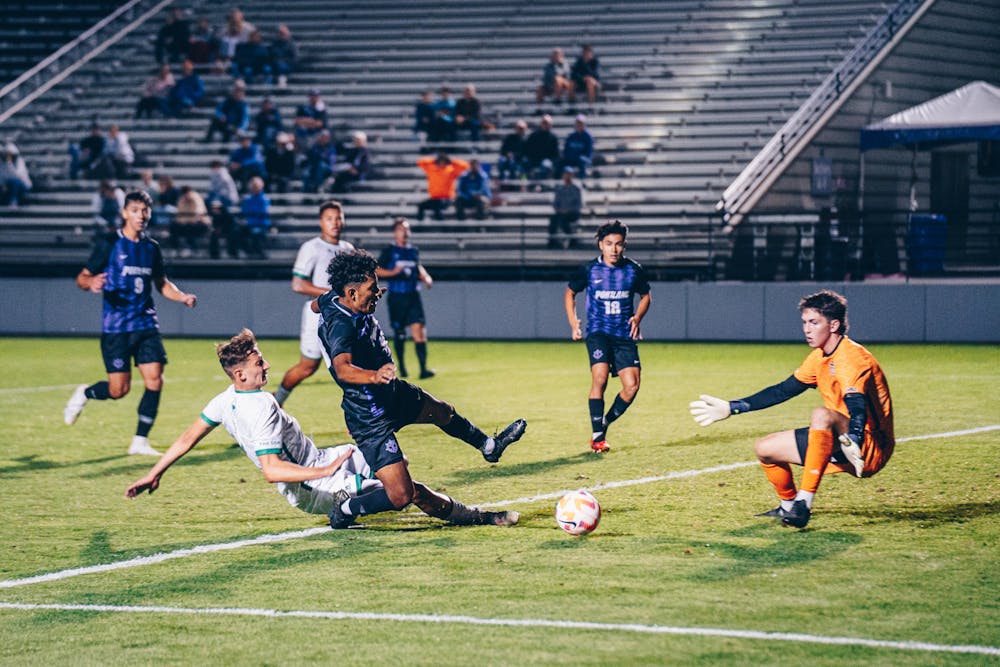On game nights at Merlo Field, the vibrancy of Portland Pilot pride is unmistakable. Students draped in vivid purple flood the stands while the ear-deafening beats of the drum squad echo through the air, their impassioned cheers punctuated by the unmistakable swirl of celebratory purple smoke through the evening sky.
Yet, amidst this spectacle, a subtler sense of pride radiates from nearly half of the men’s soccer team: a profound reverence for their Latinx heritage which many credit to being the reason they are able to call themselves Portland Pilots today.
For Hispanic Heritage Month, three players on the men’s soccer team reflected on their accomplishments and how their Latinx identity influences them on and off the pitch.
Sebastian Nava (he/him)
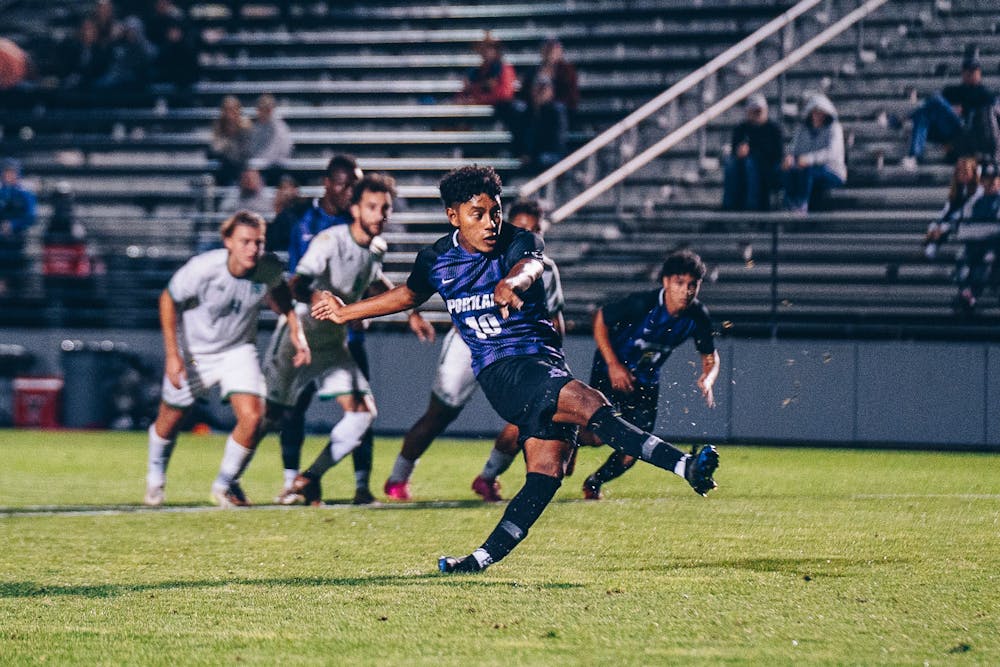
Sebastian Nava scores a penalty for the Pilots against Utah Valley.
Sebastian Nava, a Pilots midfielder, started playing soccer at the age of four in his hometown of Wilmington, California. Beyond being a source of pride for his family and community, soccer was also a solace for Nava as he attempted to navigate some of the challenges he faced in Wilmington.
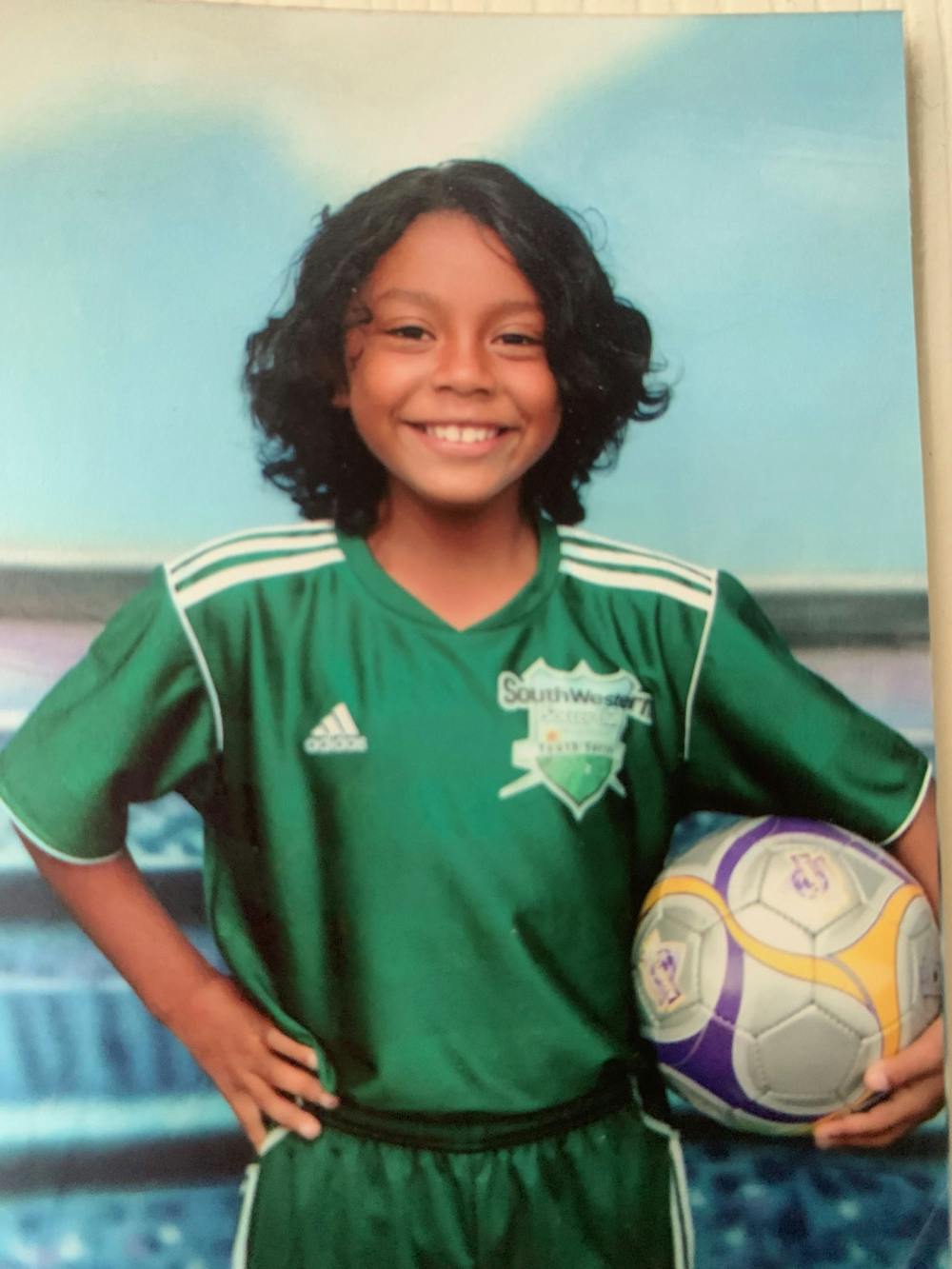
Photo courtesy of Sebastian Nava.
“My parents really put me in there [soccer] to really, you know, keep me away from other stuff that could have changed my life differently,” Nava said. “We all come from different communities and there’s so much stuff going on in those types of communities that I kind of use fútbol as an escape.”
Wilmington, a small industrial neighborhood in Harbor region LA, is home to a predominantly Latinx population. Overridden with oil refineries, the aspirations of young people are often limited to jobs in the oil industry, leading many to drop out before completing high school.
“Being part of the minority group, especially living in this country, it’s so many ways that the system is built around Latinos, Hispanics in general, to not really have a successful path,” Nava said. “It’s like growing up with a chip on my shoulder to work two times harder than every other person.”
The prejudice that Latinx communities face significantly affects their ability to follow their passions and achieve their goals, which Nava has witnessed firsthand.
“My brother is one of my biggest motivations,” Nava said. “He was also an athlete but he could not do anything with it because he was an immigrant from Mexico and the DACA program was not that strong.”
However, Nava’s frustration towards this bias only serves as motivation to push himself harder on and off the pitch to achieve his dreams. He strives to work hard for himself and those who don’t have the same opportunities as he did – which he thinks gives him a competitive edge on the field.
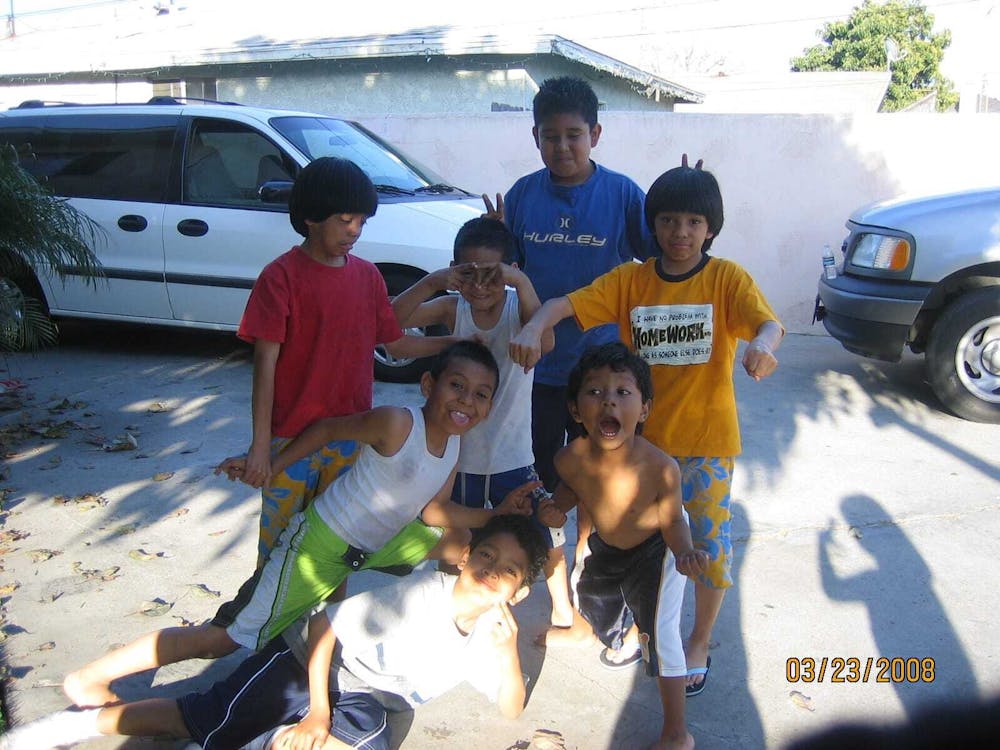
Photo courtesy of Sebastian Nava.
“I think that hard work ethic that was ingrained in my lifestyle as a young kid kind of gives me sort of an advantage,” said Nava. “When I step out there and know that I’m gonna work hard every single game.”
Nava is incredibly proud of his Latinx heritage and does not regret the journey it took him on to get him to where he is today.
“I just think it’s unique,” Nava said. “I mean, if I were to think about my 20 years on this Earth, I don’t think I’d ever want to redo it.”
Wylie Trujillo (he/him)
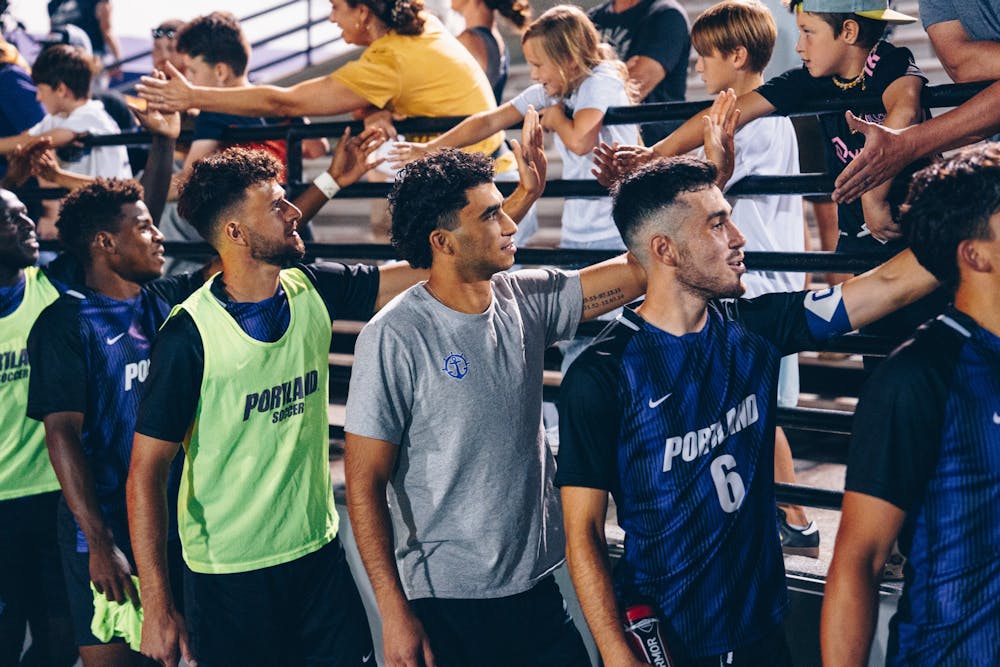
Wylie Trujillo thanks fans with the team after a win.
Wylie Trujillo, a center midfielder for the Pilots, began playing soccer in his hometown Albuquerque, New Mexico at a young age.
Due to an ACL injury, Trujillo is redshirting on the team this year. This is common for injured players who decide to take a season off to rehabilitate an injury.
Trujillo credits his Latinx community for standing in unity with him as he continues to heal from his injury. Even as he struggles to cope with not being able to participate in games, Trujillo shared that several people in his community have reached out to him as a shoulder to lean on.
“There’s a video of me posted on the soccer page and I’m not even playing right now,” Trujillo said. “I still had childhood friends supporting me and telling me that they’re thinking of me.”
The unifying nature of the Latinx community is most vividly seen through the significant commitment to family. When Trujillo was younger, his team members’ families would gather together during soccer tournaments to be in community with each other – something that he didn’t see other teams with different demographics doing.
“Some of my favorite times were not even like real competitive tournaments, but just families getting together and people just setting up random things,” Trujillo said. “I don’t know a ton of other cultures that get that type of love for soccer and family and can kind of tie it together.”
The support of his family and the pride they have in his abilities is one of the primary factors that pushes Trujillo to always be his best. Trujillo could always count on his family to attend his games and cheer him on both now and when he was younger.
“I would have my cousins at the games, my grandparents, aunts and uncles,” Trujillo said. “So I just think that having my family behind me and going to all those events even made it more important to me that I excel.”
Soccer has been – and will always be – an integral part of his life that brings his family and friends together.
“Even to this day when I go home, there’s a group of like twenty of my friends that we just go and we get together and play soccer together,” Trujillo said.
Miguel-Angel Hernandez (he/him)
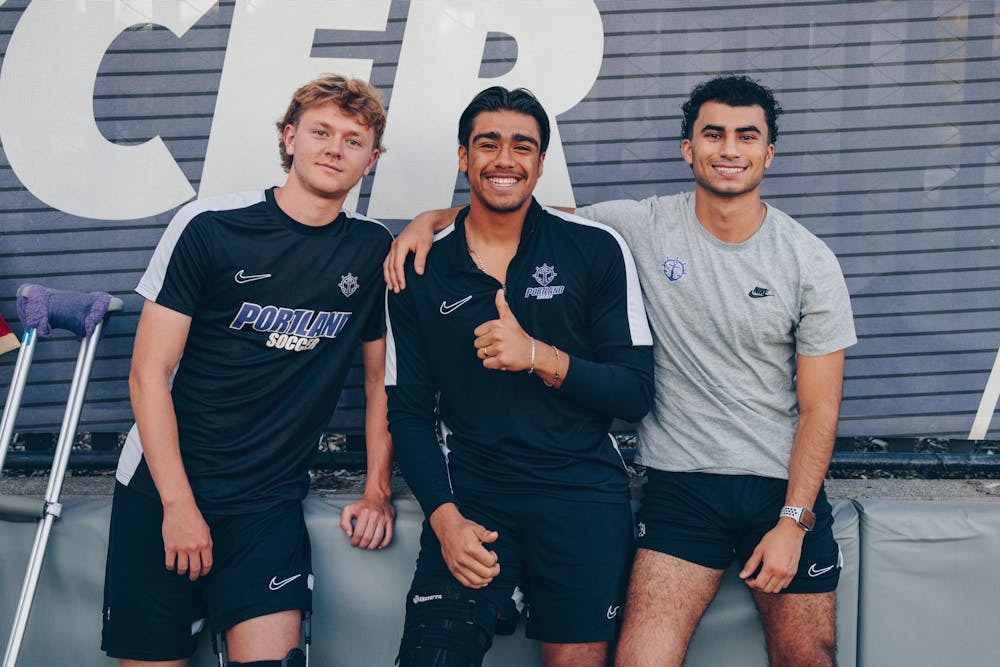
Miguel-Angel Hernandez and Wylie Trujillo pose on the sidelines before a game.
Miguel-Angel Hernandez, a goalie for the Pilots, began playing soccer when he was five years old in his hometown, Riverside, California. Hernandez was introduced to soccer by his mother, who played on the weekends in an adult league.
Seeing the passion and drive that his mother played with inspired Hernandez to get involved in soccer – and his love for soccer continued to develop as he got older.
“It just came natural,” said Hernandez. “Playing, having fun, and then just like having the support of my parents.”
However, soccer is not the only sport that Hernandez developed a passion for. Hernandez’s father introduced him to being a charro, a Mexican cowboy. Charros compete in teams through various categories, such as bull riding and horseback riding, to earn points.
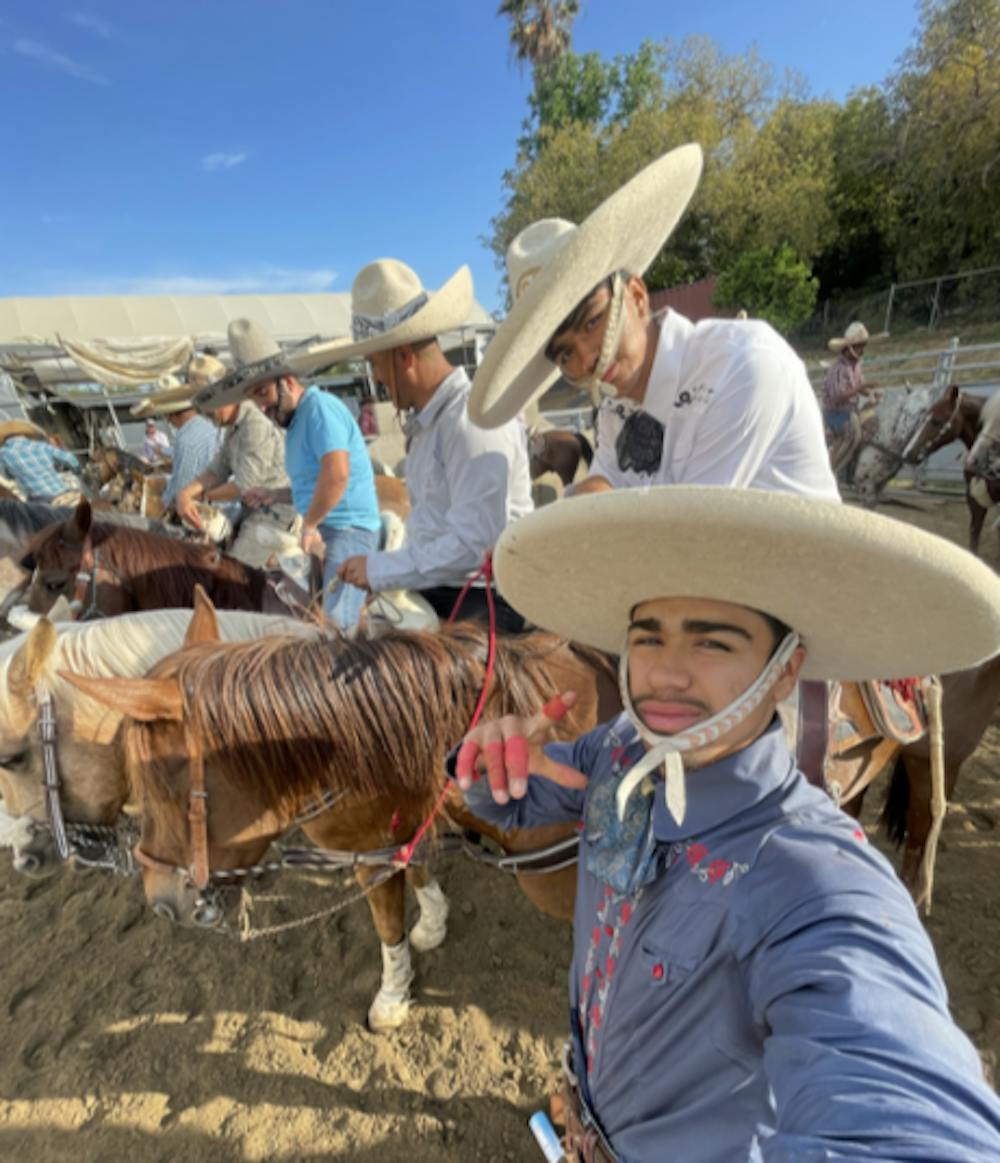
Photo courtesy of Miguel-Angel Hernandez.
At fifteen, Hernandez had to choose between pursuing a career in soccer or a career as a charro. Ultimately, he chose the former to pursue his goal of becoming a professional soccer player.
During breaks, however, Hernandez still enjoys riding the two horses that his family owns back home.
The high-paced environment of being a charro has helped Hernandez develop skills that he utilizes on the pitch that gives him an edge over other players.
“Being in those types of adrenaline like activities, I think has led me to be fearless being in the goal,” said Hernandez. “To take a hit is not as bad as knowing that you’re on the back of an animal.”
The values and lessons he learned from soccer and as a charro helped Hernandez learn more about his Latinx culture. More than anything, these sports have taught Hernandez to be proud of his identity.
“Growing up with both horses and soccer, like it makes you just get closer to the culture like knowing why we speak Spanish, why we communicate in a different way,” Hernandez said. “I think just like to be proud of who I am, and not be afraid to dress the way I dress, even if it’s not normal to other people.”
Although different in many aspects, being a charro and playing soccer has taught Hernandez the importance of being intentional in everything he does to reach his goals.
“You take care of an animal in order to perform and you also do that with your own body and also with the ball,” Hernandez said. “Like if you don’t take care of the ball, then you won’t get results.”

Photo courtesy of Miguel-Angel Hernandez.
Hernandez prioritizes representing his Latinx heritage in a way that is meaningful and respectful to those who helped him get to where he is today. No matter what he does or where he goes, Hernandez knows that he will always be able to find his community – to find la raza.
“Being Mexican-American, more than anything you have something to represent,” said Hernandez. “You’re representing your family, your siblings, your mom, your dad, you know, your last name. I think that’s something really important.”
Julianna Pedone is a reporter for The Beacon. She can be reached at pedone25@up.edu.



